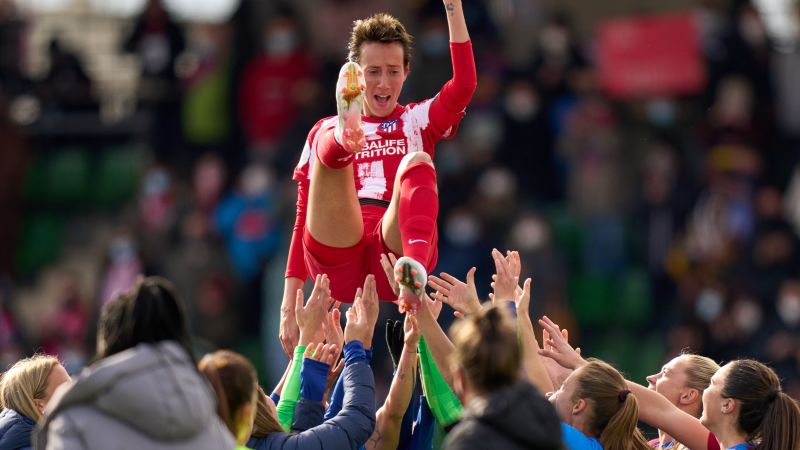Virginia Torrecilla: As she recovered from brain tumor, Atlético Madrid star left devastated by mom’s paralysis after car crash

CNN
—
Two months had passed since Virginia Torrecilla’s last chemotherapy session and the Spanish footballer felt hopeful again. She was fragile, weighed a few kilos less than she did when she was first diagnosed with a brain tumor but, in many ways, she was stronger.
Then the accident happened. “I remember everything perfectly,” she tells CNN Sport.
First came the disorienting thud that struck like a thunderbolt as a white van careened into the back of her car while she waited in Madrid traffic, then came the pain, the tears, and the heartache. She didn’t immediately know her life had changed on that June day last year. That would come later.
As she looked to her right, the sound of the car horn ringing in her ears, her mother, Mari, was bleeding and screaming that she couldn’t feel her legs.
Torrecilla told her to keep calm and phoned her Atlético Madrid teammates, who happened to be 200 meters away. Ana Romero sprinted to the scene and pulled her teammate, who had sustained minor injuries, out of the car, while Merel van Dongen stayed with Torrecilla’s mother.
Two firefighters were needed to remove Torrecilla’s mother from the wreckage. In the intensive care unit, her mother continued to say she couldn’t feel her legs. She was paralyzed from the waist down.
“It was something really difficult, something that was very hard to swallow and even today, I’m still fighting it,” says Torrecilla of coming to terms with the fact that her mom will never walk again.
Over a year later, the Mallorcan says life is “getting better every day” and believes that what is most important is that her mother is still alive.
“It’s true that she has a severe disability now, a disability which has affected every member of the family in a lot of ways,” she says.
“Our lives have changed, but we’re happy because everything is stable … We’re trying to appreciate things to the fullest, however we can, and the most important thing is that we’re together.”
It is her family, the 28-year-old says, that has helped her through her adversities these last two years, coaxing her back into football when she wanted to give up, persuading her that there was a brighter future.
“I pray no one has to live what I’ve experienced,” she says. “Honestly, I’m telling you with all my heart and, it’s not just the illness, but what happened to my mother. If it isn’t you going through a situation, but rather a loved one, it’s way more difficult.”

Torrecilla was diagnosed with a brain tumor in the spring of 2020.
Though the world was adjusting to a global pandemic, for Torrecilla life, at the time, was good. She was living in a big house with friends and keeping fit with them during lockdown, until a pain in the back of her neck started to cause problems. Headaches followed and soon came sleepless nights.
A scan would later reveal a tumor, which doctors initially thought was benign. A week after a 10-hour operation, she learned that it was stage 1 cancer and 30 rounds of radiotherapy and 15 rounds of chemotherapy would be needed. At 25, Torrecilla had to fight for her life.
She wouldn’t be able to have children, doctors said, and neither would she play football professionally again. They said she may lose feeling in her hands and feet.
“I had no idea what I was facing,” the midfielder now concedes. “And I was really scared. I remember my mother’s face when they told us everything we had to go through and my mother was speechless.
“Thankfully, I’m here today telling my story, safe and sound, and coming back to the pitch, which is something that was very important for me,” she adds.
Torrecilla’s remarkable story is featured in a UEFA series entitled “Strong Is …” which has been produced by European football’s governing body to highlight the difficulties some female footballers have faced, in the hope that their stories will inspire others to play the game.
It is difficult to watch Torrecilla’s documentary without feeling emotional, especially as we see her make her comeback, in the Supercopa final against FC Barcelona in January 2022.

With Atlético being beaten easily, Torrecilla, a substitute that day, is told to start warming up. As her number appears on the board, she high-fives teammates and embraces an opponent before stepping onto the pitch for the first time in almost two years.
In a tear-jerking moment that makes the match seem irrelevant, everyone starts to applaud her, from the players, coaches, and fans, who also chant her name. She receives the captain’s armband and goes about trying to turn the tide, unsuccessfully so, in Atlético’s favor.
“I had goosebumps,” she says in the documentary of that match, her first since playing for Spain against England in the SheBelieves Cup in March 2020.
Barcelona won the Supercopa 7-0, but it was Torrecilla who was celebrated, flung into the air by the Barça players she calls “sisters.” Her life, her fight, an inspiration to all. Against the odds, and after training harder than ever, she indeed did return to professional football.
“It was something really beautiful,” she says of that moment.

Torrecilla, once the youngest player to play in the women’s Spanish division top flight, hopes her future includes more first-team appearances for Atlético and a return to the national side, for whom she has represented 66 times. But the last two years have taught her to also live life day-by-day, to enjoy the little moments.
“I’ve always said that, after my illness, after these last two years, Virginia has turned into a completely different Virginia. I think about things differently, I act different and I’m aware of a lot of other things that I wasn’t before,” she says.
And what would she say to anyone who is undergoing cancer treatment?
“There will be times you fall, there will be times when you don’t want to come out of the dark, but it will always be worth it to reach the end of the journey,” she says. “And that no one should ever regret being brave. If you don’t do it, you will regret it. So more than anything, keep pushing.”




